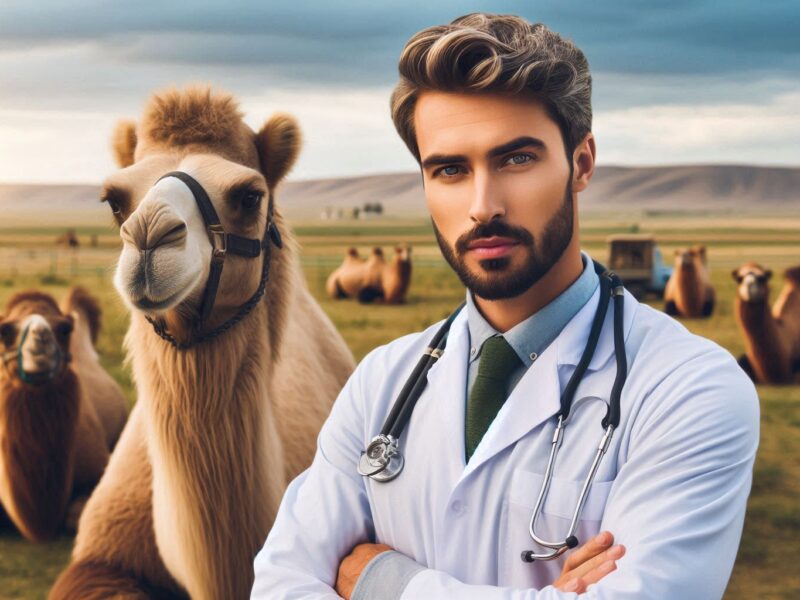Ever thought of becoming a vet for one of the most elite athletes in the desert? Racing camels aren’t just animals—they’re a cultural treasure, a competitive powerhouse, and a multimillion-dollar industry in the Gulf region. Their performance and health lie in the hands of skilled professionals. That’s where you come in—as an experienced camel veterinarian focused on sports medicine and lameness treatment.
Overview of the Position
This isn’t your average veterinary job. Based on-site at a prestigious racing camel training farm in Qatar, this role is immersive, challenging, and rewarding. You’re not only treating animals; you’re optimizing athletes for performance. The job is full-time and on-site, with accommodation provided—meaning you live and breathe camel care every day.
About Sahary Veterinary Center
Sahary Veterinary Center is a leading name in camel breeding, genetics, and healthcare in Qatar. They’ve carved out a space as innovators in embryo transfer and reproductive treatments. But they’re not just about lab coats and test tubes—they’re in the field, working with breeders to boost performance and productivity through precision veterinary medicine.
With state-of-the-art labs and a dedicated focus on herd health and genetic improvement, Sahary stands at the frontier of camel veterinary science. If you’re looking to practice high-level veterinary medicine in a culturally rich and scientifically advanced environment, this is your arena.
The Role of a Camel Veterinarian
Let’s get something straight—working with camels isn’t like working with horses, cows, or pets. These are intelligent, strong-willed, and high-value animals. Your job as a sports medicine and lameness specialist isn’t just about healing injuries—it’s about keeping these animals in peak form and preventing problems before they arise.
You’re their coach, therapist, and health strategist, all rolled into one.
Sports Medicine in Camel Racing
In camel racing, milliseconds matter. Your knowledge in sports medicine plays a huge role in ensuring top-tier performance. From nutrition strategies to musculoskeletal health, you’re part of the team that keeps these animals in winning condition.
It’s not just about treating illness—it’s about enhancing vitality, speed, and stamina.
Diagnosing and Treating Lameness
Lameness can be a career-ending issue for a racing camel. It’s your job to detect it early and act fast. By evaluating gait, listening to handlers, and using high-tech tools, you pinpoint the root causes and develop customized treatment plans.
Your expertise ensures that minor issues don’t become major setbacks.
Radiography & Ultrasonography
Digital radiography and musculoskeletal ultrasonography are your best friends. They allow you to peer inside the camel’s joints and tendons, helping you make precise, evidence-based decisions.
You’ll need to be fluent with this technology—because accurate diagnosis is everything.
Rehabilitation Protocols
Healing doesn’t stop after treatment—it extends into structured rehab. You’ll be crafting step-by-step recovery programs, from cold therapy and massage to controlled exercise routines. Close coordination with handlers ensures that recovery is both smooth and safe.
This is where your sports medicine expertise truly shines.
Required Qualifications
To qualify for this position, you’ll need a DVM or equivalent veterinary degree and a minimum of five years of veterinary experience—ideally with camels or equines. A valid veterinary license—or eligibility to get one—under Qatar’s Ministry of Municipality is essential.
Camel experience is ideal, but if you’ve got equine lameness skills, you’re halfway there.
Skills That Set You Apart
Fluency in Arabic is a must. Communication with trainers, handlers, and the broader veterinary team happens in Arabic, so language proficiency isn’t optional—it’s mission-critical. Bonus points if you’re also fluent in English or other languages.
Beyond language, you should have:
-
Strong diagnostic imaging skills
-
Deep knowledge of camel anatomy and physiology
-
An understanding of sports medicine principles applied to camelids
Living and Working On-Site
This isn’t your typical 9-to-5. You’ll be living right on the farm, where elite racing camels are trained and cared for. The on-site accommodation is fully provided, so you won’t need to worry about housing or commuting.
It’s a unique lifestyle—immersive, focused, and ideal for someone truly passionate about animal health.
Collaboration and Communication
Camel care is a team effort. You’ll be working closely with seasoned handlers, expert trainers, and other veterinary professionals. Your ability to explain medical conditions and rehab protocols clearly—especially in Arabic—makes all the difference in effective care.
Good communication saves lives—and wins races.
Cutting-Edge Veterinary Tools
You won’t be working with outdated equipment here. Sahary Veterinary Center offers:
-
Advanced imaging technology
-
A top-tier veterinary diagnostic lab
-
Embryo transfer and reproductive tech
-
Data tracking tools for herd health
This is veterinary medicine at its finest.
Career Growth Opportunities
Joining Sahary isn’t just a job—it’s a career accelerator. Whether you’re aiming for board certification, advanced courses, or leadership in veterinary sports medicine, this role gives you the experience, network, and resources to grow.
They even support ongoing training and seminars to keep your knowledge cutting-edge.
How to Apply
Interested? Here’s what you need:
-
A strong CV with veterinary experience
-
A cover letter detailing your passion for camel medicine
-
References from trusted veterinary professionals
Send it all to Sahary Veterinary Center through their official channels.
Make sure your application highlights your lameness diagnostic skills, imaging expertise, and Arabic fluency—those are gold.
Conclusion
If you’re a veterinarian with a passion for performance animals and a love for the desert’s most iconic creatures, this is your dream job. At Sahary Veterinary Center, you won’t just be treating camels—you’ll be shaping champions, supporting cultural traditions, and driving veterinary innovation forward.
Don’t miss the chance to make your mark in the world of camel sports medicine. Saddle up—your next adventure awaits in Qatar.
FAQs
1. Do I need prior camel experience to apply?
Not necessarily. Experience with equines, especially in lameness and sports medicine, is highly valued and transferable to camel care.
2. What are the working hours like?
Expect full-time, on-site commitment. Days are structured around camel training schedules and medical needs.
3. Is accommodation really included?
Yes, comfortable on-site housing is fully provided, so you can focus on your work without worrying about logistics.
4. Will I have access to continuing education?
Absolutely. Sahary Veterinary Center supports professional development and offers opportunities to attend workshops and seminars.
5. How important is Arabic fluency?
Very important. Most communication on the farm is in Arabic, so fluency is crucial for success in the role.


Comments